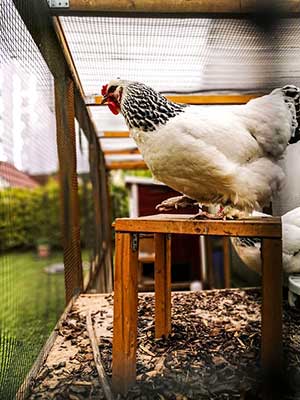Are raccoons giving your chickens a hard time?
These clever critters can significantly threaten your feathered pets, but with the right strategies, you can safeguard your chickens from raccoon invasions in the future. Let’s dive into how to keep raccoons away from chickens!
Where Are Raccoons Found in Canada?
Raccoons typically thrive in more forested regions, where they have plenty of natural cover and food sources. But contrary to what many people think, they’re also frequently found in more suburban environments, too. You’re likely to encounter raccoons near water sources like rivers, lakes, and streams, where they have ample food and hydration. Raccoons are typically found in every province other than Newfoundland and Labrador.
Why Raccoons Are Dangerous to Your Chickens
Raccoons are opportunistic feeders and will prey on chickens if given the chance. Their natural scavenging instincts lead them to seek out easy meals, making your chickens a prime target.
Even if you feel your chickens are safely housed in a coop, raccoons are great climbers, and can easily breach poorly secured coop areas if given half a chance. If allowed, a raccoon WILL rip a chicken. Raccoon feces, which will likely be around your flock, may also contain parasites and bacteria harmful to both humans and chickens.
The worst part is that once raccoons discover a food source like chickens, they will return and become persistent pests. Even if you manage to deter raccoons at the moment, they could continue to pose a threat in the future.
If you’re wondering about “how to keep raccoons and possums away from my chickens?” and none of these measures are succeeding in keeping wildlife from attacking your chickens, call animal control specialists so they can properly remove them.
Signs That Raccoons Are Near Your Chickens
Wondering “how to keep raccoons away from my chickens?” First, you need to know how to spot their presence. Here are some signs that wildlife removal specialists look for to confirm that raccoons are lurking near your coop:
 Damaged Coop or Fencing
Damaged Coop or Fencing
Regularly inspect your coop and fencing for signs of damage or weakness — specifically, holes, gaps, or other vulnerabilities that could allow raccoons to access your chickens. Promptly repair any damage you find to ensure the security of your flock, consider adding more reinforcements to your coop doors, like latches to prevent raccoons from prying them open.
You might even want to consider installing electric fencing or a predator apron to deter raccoons from digging under the fence and gaining access to your chickens.
Tracks
Keep an eye out for distinctive raccoon footprints around the coop or in the surrounding area. Raccoon tracks typically show five toes and can measure 2-3 inches in length.
Look for tracks in mud, snow, or soft soil, providing clear evidence of raccoon activity near your chickens. If you spot raccoon tracks, it’s a good sign that they’re nearby and may be targeting your flock.
Droppings
Be on the lookout for raccoon droppings near your coop or run. Raccoon feces are often found near feeding areas, water sources, or along travel routes. They’re cylindrical (similar to dog droppings) but with a darker coloration and a strong odor.
Finding raccoon droppings near your chickens is a clear sign that raccoons have been in the vicinity and may pose a threat to your flock.
Scattered Feathers
You should always be watching for a trail of feathers scattered around the coop, run, or in nearby trees or bushes. Raccoons are known to leave behind feathers after attacking and consuming chickens.
Scratching Noises
Listen for scratching or rustling noises coming from the coop or surrounding areas, especially during the evening and early morning hours. The scratching noises indicate that the raccoon may be attempting to gain access to your chickens or their food source.
How to Keep Raccoons Away From Chickens
Now that we've identified the signs of raccoon activity near your chickens, let's explore effective strategies on how to keep raccoons away from your chickens.
Secure Your Coop with Predator-Proof Designs
When re-building or updating your chicken coop, use materials like hardware cloth to cover windows, vents, and other openings, preventing raccoons from gaining access to your coop.
As far as the doors and latches go, consider installing predator-proof locks or latches that require both twisting and lifting to open, as raccoons are adept at manipulating simple closures.
In addition to this, you might also want to add ¾-inch welded wire, as this will be the most effective material; hardware cloth ranges in strength and durability and is the bare minimum form of intervention. Raccoons are skilled diggers and can easily burrow under fencing if it’s not properly secured. Also keep in mind that chain-link fences are not effective unless they are very high and also dug deeply down around the perimeter, as racoons are great at both climbing and burrowing. Steel beam rollers are also ineffective, as predator birds such as hawks can reach through, and raccoons can easily squeeze through and around.
Install Motion-Activated Lights or Sprinklers
These should be strategically placed around the coop perimeter. Both of these can startle raccoons and deter them from approaching your coop in the future.
Try to find lights with adjustable sensitivity settings to avoid them being triggered by strong winds. If you want maximum effectiveness, invest in both motion-activated lights and sprinklers with other natural deterrents like secure fencing and deterrent scents to double down on your raccoon prevention around your coop.
Use Deterrent Scents
Speaking of deterrent scents, raccoons have extremely sensitive noses.
Consider using natural raccoon deterrents such as coyote urine, peppermint oil, cayenne pepper, or vinegar around the perimeter of the coop. These scents can mask the smell of your chickens and discourage raccoons from approaching altogether.
After a strong rain or wind, reapply these scents to make sure they’re potent enough to stay effective.
Secure Your Trash Cans
Raccoons can also be attracted to your home by trash cans and stay for the chickens!
Make sure to have tightly sealed cans with locking lids, stored in a secure location far away from your coop and chicken feed. In addition, if you do happen to see any spilled food or garbage around the coop, clean it promptly so you can continue discouraging any frequenting to your property in search of food.
Keep Chicken Feed Away
We’ve mentioned raccoons being attracted to the chicken feed itself — a big part of how to protect chickens from raccoons is to store chicken feed in containers that raccoons can’t smell or access. Try to put your feeders away at night to prevent raccoons from smelling them during their most active hours.
When you do have them out, choose sturdy containers with tight-fitting lids (similar to securing your garbage can), and consider using treadle feeders that only open when your chickens step on them. These are designed specifically to prevent raccoons from accessing your feed.
Let Hawkeye Help Control Your Raccoons
Struggling to keep raccoons away even after taking all the prevention measures? It might be time to call in the professionals. Reach out to Hawkeye Animal Control Specialists for assistance on how to keep raccoons away from your chickens. We’ve helped countless homeowners effectively manage raccoon populations and protect chickens, safely trapping raccoons and relocating them to a more suitable habitat far away from your property.
Of course, we can always assess your property for vulnerabilities and recommend and implement preventative measures on how to keep raccoons and possums away from chickens.
ilities and recommend and implement preventative measures on how to keep raccoons and possums away from chickens.














